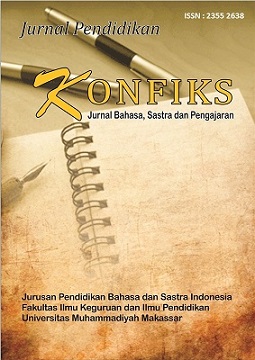EXPLORING STUDENTS’ PER CEPTION OF USING STORYBIRD ON ENGLISH WRITING SKILL
DOI: https://doi.org/10.26618/53s7p894
Abstrak
This qualitative study explores students’ perceptions of using Storybird to develop English writing skills among 18 intermediate-level students at SMA Negeri Binjai over a 10-week implementation period. Employing a mixed-methods approach, data were collected through structured questionnaires based on the Technology Acceptance Model (TAM) and Self-Determination Theory (SDT), as well as semi-structured interviews. The findings reveal that students’ perceptions were predominantly positive, with 81.1% reporting favorable views of Storybird. Creativity stimulation (88.8%) and increased motivation (87.5%) emerged as the platform’s strongest attributes. Students appreciated the visual storytelling approach for generating ideas, organizing writings more effectively, and facilitating collaborative learning. Challenges identified included platform navigation and internet connectivity issues. The study confirms that Storybird effectively supports three basic psychological needs autonomy, competence, and relatedness—enhancing intrinsic motivation and self-efficacy in writing. These findings contribute to the literature on technology-enhanced language learning and provide empirical support for using digital storytelling platforms in teaching English as a foreign language (EFL).
Unduhan
Diterbitkan
Terbitan
Bagian
Lisensi

Artikel ini berlisensi Creative Commons Attribution 4.0 International License.
Authors who publish with this journal agree to the following terms:
The author owns the copyright and grants the journal rights for first publication with the work simultaneously licensed under a Creative Commons Attribution License which allows others to share the work with acknowledgment of the work's authorship and initial publication in this journal.
Authors may enter into separate additional contractual agreements for the non-exclusive distribution of the published journal version of the work (for example, posting it to an institutional repository or publishing it in a book), with acknowledgment of its initial publication in this journal.
Authors are permitted and encouraged to post their work online (for example, in institutional repositories or on their websites) before and during the submission process, as this can lead to productive exchanges, as well as earlier and larger citations of published work (See The Effect of Open Access).
Statement of Authenticity and Manuscript Copyright can be downloaded: Here
After filling in the statement letter, please send via e-mail: konfiks@unismuh.ac.id





.png)


